八下 Unit 7 What's the highest mountain in the world 单元知识点课件(共27张PPT)
文档属性
| 名称 | 八下 Unit 7 What's the highest mountain in the world 单元知识点课件(共27张PPT) | 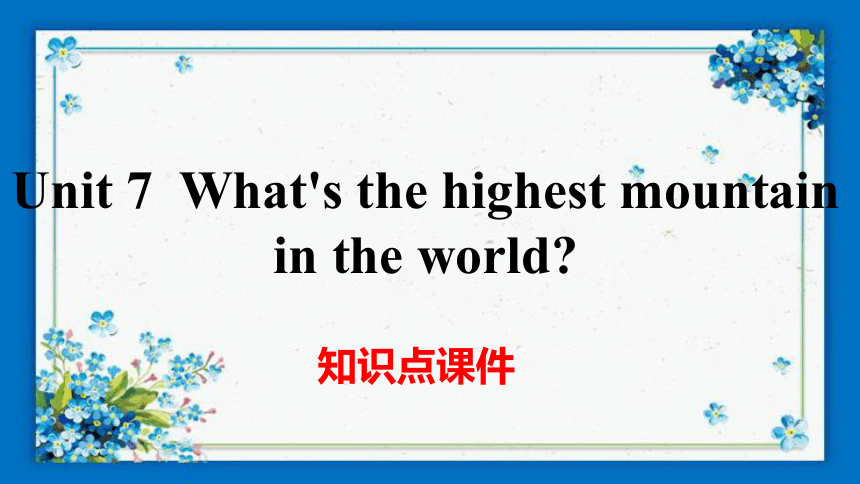 | |
| 格式 | pptx | ||
| 文件大小 | 226.1KB | ||
| 资源类型 | 教案 | ||
| 版本资源 | 人教新目标(Go for it)版 | ||
| 科目 | 英语 | ||
| 更新时间 | 2023-06-20 17:11:38 | ||
图片预览

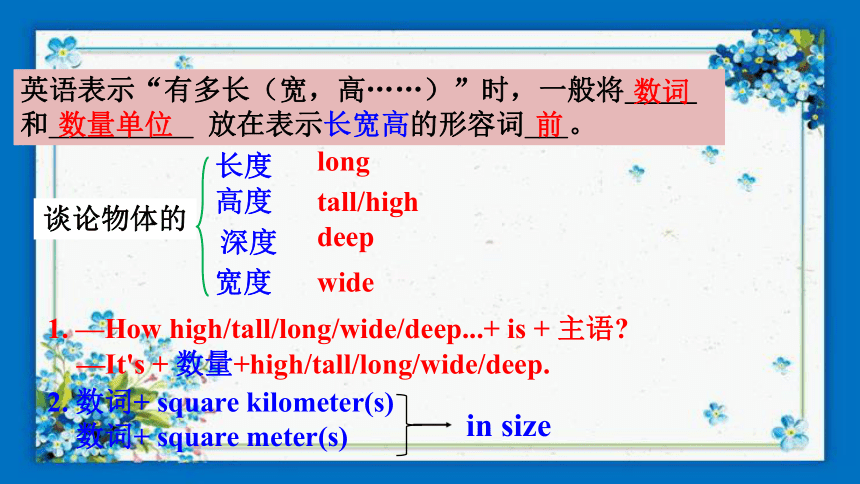
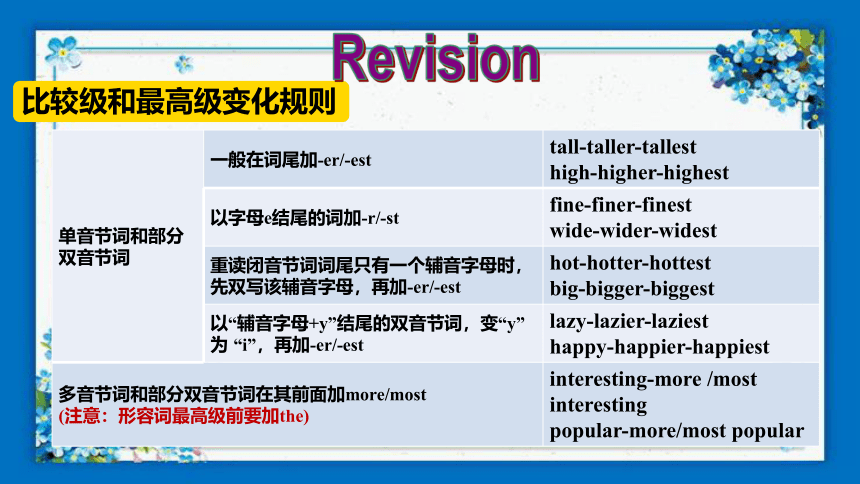
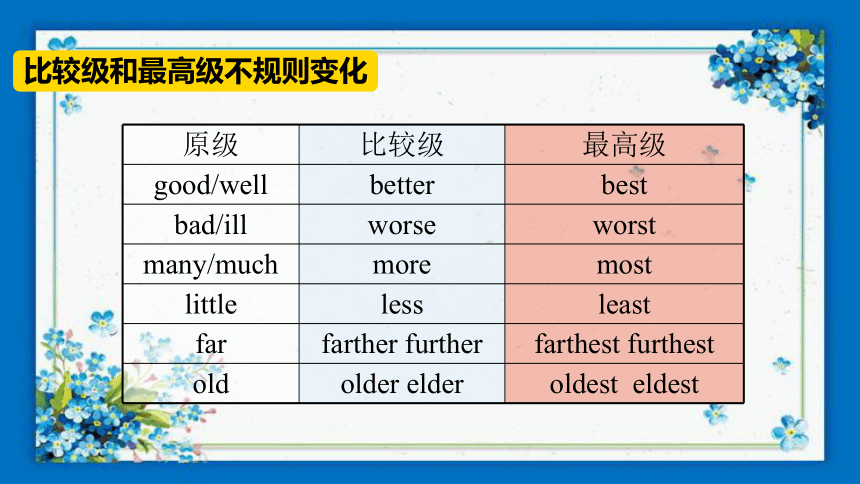
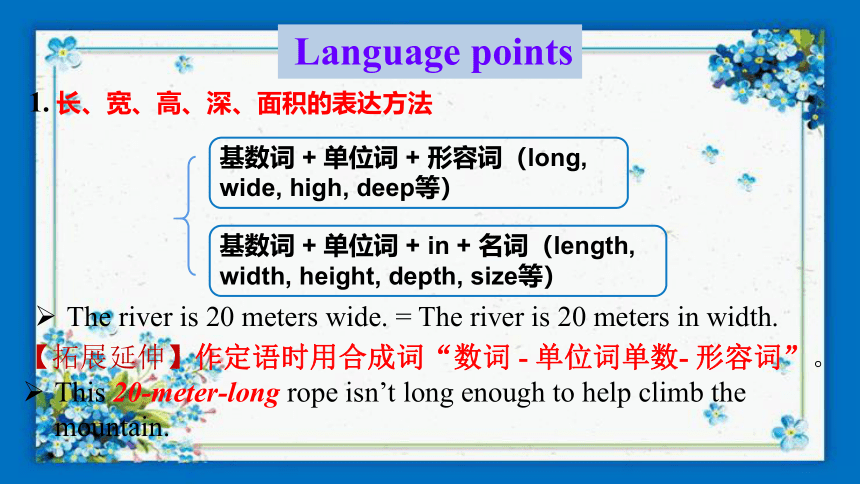
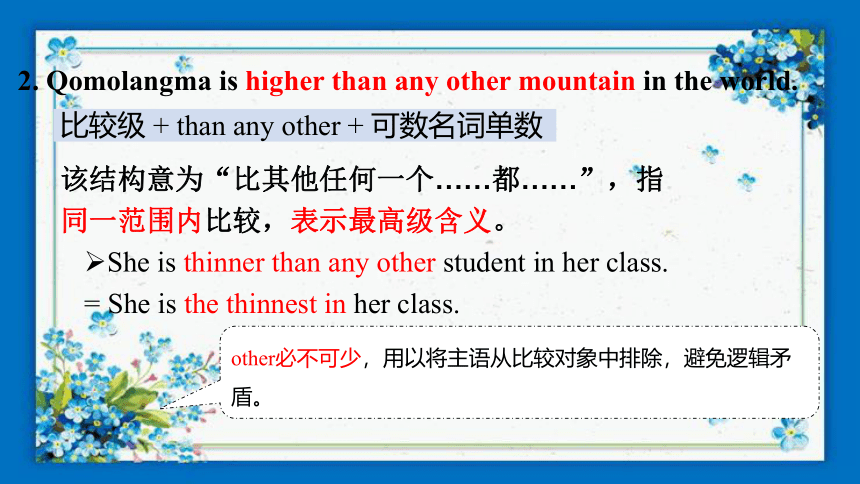
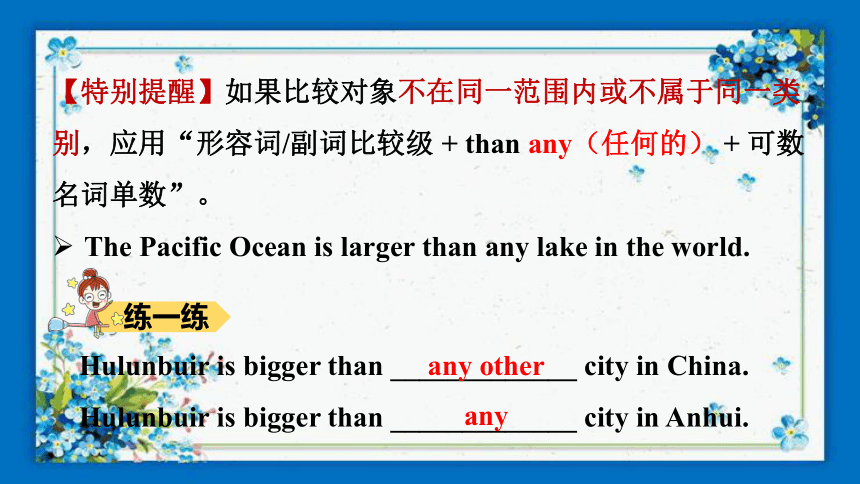
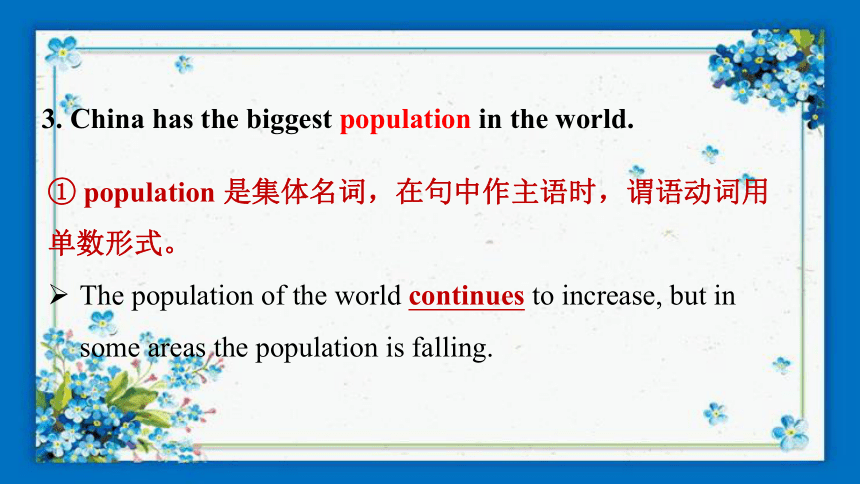
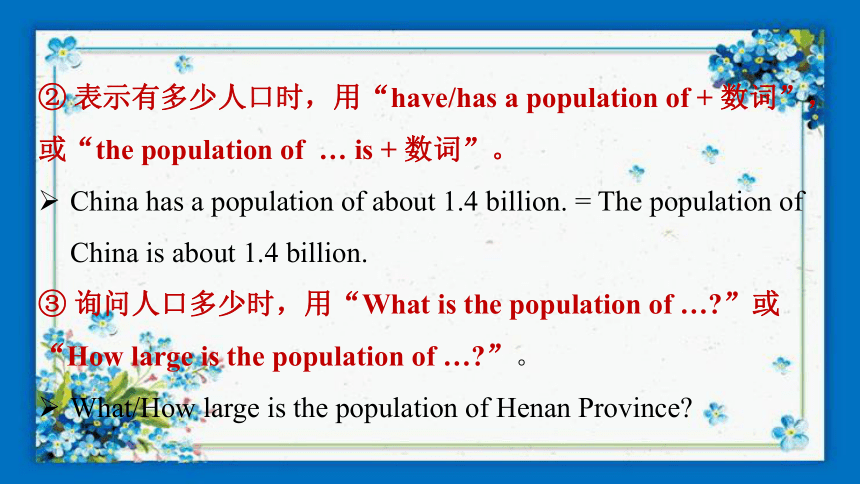
文档简介
(共27张PPT)
知识点课件
Unit 7 What's the highest mountain in the world
谈论物体的
宽度
深度
高度
长度
tall/high
deep
long
wide
—It's + 数量+high/tall/long/wide/deep.
1. —How high/tall/long/wide/deep...+ is + 主语
2. 数词+ square kilometer(s)
数词+ square meter(s)
in size
英语表示“有多长(宽,高……)”时,一般将_____和__________ 放在表示长宽高的形容词___。
数词
数量单位
前
比较级和最高级变化规则
Revision
单音节词和部分双音节词 一般在词尾加-er/-est tall-taller-tallest
high-higher-highest
以字母e结尾的词加-r/-st fine-finer-finest
wide-wider-widest
重读闭音节词词尾只有一个辅音字母时,先双写该辅音字母,再加-er/-est hot-hotter-hottest
big-bigger-biggest
以“辅音字母+y”结尾的双音节词,变“y” 为 “i”,再加-er/-est lazy-lazier-laziest
happy-happier-happiest
多音节词和部分双音节词在其前面加more/most (注意:形容词最高级前要加the) interesting-more /most interesting
popular-more/most popular
原级 比较级 最高级
good/well better best
bad/ill worse worst
many/much more most
little less least
far farther further farthest furthest
old older elder oldest eldest
比较级和最高级不规则变化
Language points
1. 长、宽、高、深、面积的表达方法
The river is 20 meters wide. = The river is 20 meters in width.
基数词 + 单位词 + 形容词(long, wide, high, deep等)
基数词 + 单位词 + in + 名词(length, width, height, depth, size等)
【拓展延伸】作定语时用合成词“数词 - 单位词单数- 形容词”。
This 20-meter-long rope isn’t long enough to help climb the mountain.
2. Qomolangma is higher than any other mountain in the world.
该结构意为“比其他任何一个……都……”,指同一范围内比较,表示最高级含义。
She is thinner than any other student in her class. = She is the thinnest in her class.
other必不可少,用以将主语从比较对象中排除,避免逻辑矛盾。
比较级 + than any other + 可数名词单数
【特别提醒】如果比较对象不在同一范围内或不属于同一类别,应用“形容词/副词比较级 + than any(任何的) + 可数名词单数”。
The Pacific Ocean is larger than any lake in the world.
练一练
Hulunbuir is bigger than _____________ city in China.
Hulunbuir is bigger than _____________ city in Anhui.
any other
any
3. China has the biggest population in the world.
① population 是集体名词,在句中作主语时,谓语动词用单数形式。
The population of the world continues to increase, but in some areas the population is falling.
② 表示有多少人口时,用“have/has a population of + 数词”,或“the population of … is + 数词”。
China has a population of about 1.4 billion. = The population of China is about 1.4 billion.
③ 询问人口多少时,用“What is the population of … ”或“How large is the population of … ”。
What/How large is the population of Henan Province
④ 表示人口多少时,用 big/large 或 small 修饰,而不能用 many,much 或 few 等。
India has a large population.
类似的,表示 price(价格)高低,用 high 或 low,不能用 expensive 或 cheap;表示 temperature(温度)高低,用 high 或 low,不能用 hot 或 cold。
4. Feel free to ask me anything on today’s Great Wall tour.
tour在此处作可数名词,还可以作动词。
They went on a tour around Europe last year. ( n.)
We toured Italy for our holiday last year. ( v.)
【拓展延伸】
tour (v.) + 后缀 -ist → tourist (n.) 旅行者;观光者
The tourists (n.) toured (v.) Hong Kong for holidays. They all enjoyed their tour (n.).
tour n. & v. 旅行;旅游
5. Wow, that’s amazing.
amazing一般用于修饰事物,amazed(感到惊奇的)常用于修饰人。 be amazed at 意为“对……感到惊讶”。
The amazing magic show made me feel so amazed.
I’m amazed at his rapid progress.
amazing adj. 令人大为惊奇的;令人惊喜(惊叹)的
【拓展延伸】类似的以 -ing(令人……),-ed(感到……)结尾的形容词:
interesting/interested, surprising/surprised, relaxing/relaxed, moving/moved, tiring/tired, boring/bored, exciting/excited, …
6. The main reason was to protect their part of the country.
protect此处用作及物动词, protect… against/from…“保护……免于……”。protection作不可数名词,意为“保护;防卫”。
Are we doing enough to protect the environment
He wears a scarf to protect himself against/from the strong wind.
It’s parents’ duty to provide protection for their children.
protect v. 保护;防护
7. Even more serious difficulties include freezing weather conditions and heavy storms.
His job includes looking after the wounded.
including 介词 意为“包括……在内”,后接名词或代词作宾语。
included 形容词 意为“包括在内的”,位于所修饰的名词或代词后。
There are 40 students in the classroom, including me.
= There are 40 students in the classroom, me included.
【拓展延伸】
include v. 包括;包含
difficulty既可作可数名词也可作不可数名词,在此用作可数名词。
作可数名词时,difficulty通常用作复数,表示具体概念,即:各种各样的“困难;难题;难事”。例如:
e.g. People learning a new language may face some difficulties.
人们学习一门新的语言时可能会遇到一些困难。
e.g. If you have any difficulties, you can call me for help.
如果你遇到任何困难,给我打电话。
作不可数名词时,difficulty可译作“困难;艰难;辛苦;费劲”。
e.g. He had great difficulty in finding a new job.
他找新的工作费了很大劲。
e.g. We found the house without difficulty.
我们轻而易举地找到了那座房子。
freezing adj. 极冷的;冰冻的
相当于extremely cold
【拓展延伸】
freezing 可以作名词,意为“冰点”。
e.g. The temperature is below freezing.
freeze v.冻结;使冻住,其过去式及过去分词分别为
froze和frozen。
e.g. Water freezes at 0℃.
condition n. 条件;状况
既可作可数名词也可作不可数名词,在此用作可数名词。
【常用短语】
be in good/bad condition 处于良好/糟糕的状态
weather condition 天气状况
living condition 居住条件
out of condition 健康状况不佳
8. …, while the first woman to succeed was Junko Tabei from Japan in 1975.
succeed 作不及物动词,其后不能直接跟宾语,主语通常是人或组织等,succeed in doing sth. 表示“成功做某事”。
Very few people succeed in losing weight and keeping it off.
succeed v. 实现目标;成功
【拓展延伸】成功相关的词 反义词
succeed v. 成功 fail v. 失败
success n. 成功 failure / unsuccess n. 失败
successful adj. 成功的 unsuccessful adj. 不成功的
successfully adv. 成功地 unsuccessfully adv. 不成功地
9. The spirit of these climbers shows us that we should never give up trying to achieve our dreams.
achieve 在此作及物动词,其主语通常为人, 宾语通常为目标、目的或胜利、成功等。achieve one’s dream=realize one’s dream=make one’s dream come true, 意为“实现某人的梦想”。
He achieved/realized his dream of becoming an engineer.
= His dream of becoming an engineer came true.
【拓展延伸】achieve + 后缀 -ment → achievement n. 成就;成绩
achieve v.达成;完成;成功
10. It also shows that humans can sometimes be stronger than the forces of nature.
force既可指实际意义上的力,如自然力,又可指抽象意义的力,如影响力。the force of“……的力量/力”。
He changed the world through the force of his ideas.
【拓展延伸】force还可作动词,意为“迫使;强迫”,force sb. to do sth. 表示“迫使某人做某事”。
Wars forced them to leave their homes.
force n. 力;力量
No ocean in the world is as big as the Pacific Ocean.
as+形容词/副词原级+as 表示双方在程度、性质、特征等方面一样。此句意为“世界上没有和太平洋一样大的海洋”,表示“太平洋是世界上最大的海洋” ,表示最高级含义,可与表示最高级的句子进行转换。
否定句型:not...as/so+形容词/副词原级+as 意为“不如……”。
11. At 9: 00 a. m., they find that most of the babies are already awake and hungry.
awake 作形容词,常位于系动词之后作表语,不可位于名词前作定语, 可以作定语的是waking。
She was awake all night.
Most of their waking hours are spent eating.
【拓展延伸】表示睡觉整个过程的相关词汇参考:
sleepy (adj. 打瞌睡的) → go to bed/go to sleep (v. 去睡觉)
→ sleep (v. 睡觉) → fall asleep (v. 入睡) → asleep (adj. 睡着的)
→ wake (up)(v. 醒来;唤醒) → awake (adj. 醒着的)
→ get up (v. 起床)
12. The babies often die from illnesses and do not live very long.
【易混辨析】die from与die of
die from 侧重指外部原因造成的死亡,如负伤、事故、折磨等。 表示死于疾病时,二者可以互换。
die of 侧重指内部原因造成的死亡,如饥饿、衰老或悲伤等。 He died from overwork.
The famous writer died of/from cancer last year.
知识点课件
Unit 7 What's the highest mountain in the world
谈论物体的
宽度
深度
高度
长度
tall/high
deep
long
wide
—It's + 数量+high/tall/long/wide/deep.
1. —How high/tall/long/wide/deep...+ is + 主语
2. 数词+ square kilometer(s)
数词+ square meter(s)
in size
英语表示“有多长(宽,高……)”时,一般将_____和__________ 放在表示长宽高的形容词___。
数词
数量单位
前
比较级和最高级变化规则
Revision
单音节词和部分双音节词 一般在词尾加-er/-est tall-taller-tallest
high-higher-highest
以字母e结尾的词加-r/-st fine-finer-finest
wide-wider-widest
重读闭音节词词尾只有一个辅音字母时,先双写该辅音字母,再加-er/-est hot-hotter-hottest
big-bigger-biggest
以“辅音字母+y”结尾的双音节词,变“y” 为 “i”,再加-er/-est lazy-lazier-laziest
happy-happier-happiest
多音节词和部分双音节词在其前面加more/most (注意:形容词最高级前要加the) interesting-more /most interesting
popular-more/most popular
原级 比较级 最高级
good/well better best
bad/ill worse worst
many/much more most
little less least
far farther further farthest furthest
old older elder oldest eldest
比较级和最高级不规则变化
Language points
1. 长、宽、高、深、面积的表达方法
The river is 20 meters wide. = The river is 20 meters in width.
基数词 + 单位词 + 形容词(long, wide, high, deep等)
基数词 + 单位词 + in + 名词(length, width, height, depth, size等)
【拓展延伸】作定语时用合成词“数词 - 单位词单数- 形容词”。
This 20-meter-long rope isn’t long enough to help climb the mountain.
2. Qomolangma is higher than any other mountain in the world.
该结构意为“比其他任何一个……都……”,指同一范围内比较,表示最高级含义。
She is thinner than any other student in her class. = She is the thinnest in her class.
other必不可少,用以将主语从比较对象中排除,避免逻辑矛盾。
比较级 + than any other + 可数名词单数
【特别提醒】如果比较对象不在同一范围内或不属于同一类别,应用“形容词/副词比较级 + than any(任何的) + 可数名词单数”。
The Pacific Ocean is larger than any lake in the world.
练一练
Hulunbuir is bigger than _____________ city in China.
Hulunbuir is bigger than _____________ city in Anhui.
any other
any
3. China has the biggest population in the world.
① population 是集体名词,在句中作主语时,谓语动词用单数形式。
The population of the world continues to increase, but in some areas the population is falling.
② 表示有多少人口时,用“have/has a population of + 数词”,或“the population of … is + 数词”。
China has a population of about 1.4 billion. = The population of China is about 1.4 billion.
③ 询问人口多少时,用“What is the population of … ”或“How large is the population of … ”。
What/How large is the population of Henan Province
④ 表示人口多少时,用 big/large 或 small 修饰,而不能用 many,much 或 few 等。
India has a large population.
类似的,表示 price(价格)高低,用 high 或 low,不能用 expensive 或 cheap;表示 temperature(温度)高低,用 high 或 low,不能用 hot 或 cold。
4. Feel free to ask me anything on today’s Great Wall tour.
tour在此处作可数名词,还可以作动词。
They went on a tour around Europe last year. ( n.)
We toured Italy for our holiday last year. ( v.)
【拓展延伸】
tour (v.) + 后缀 -ist → tourist (n.) 旅行者;观光者
The tourists (n.) toured (v.) Hong Kong for holidays. They all enjoyed their tour (n.).
tour n. & v. 旅行;旅游
5. Wow, that’s amazing.
amazing一般用于修饰事物,amazed(感到惊奇的)常用于修饰人。 be amazed at 意为“对……感到惊讶”。
The amazing magic show made me feel so amazed.
I’m amazed at his rapid progress.
amazing adj. 令人大为惊奇的;令人惊喜(惊叹)的
【拓展延伸】类似的以 -ing(令人……),-ed(感到……)结尾的形容词:
interesting/interested, surprising/surprised, relaxing/relaxed, moving/moved, tiring/tired, boring/bored, exciting/excited, …
6. The main reason was to protect their part of the country.
protect此处用作及物动词, protect… against/from…“保护……免于……”。protection作不可数名词,意为“保护;防卫”。
Are we doing enough to protect the environment
He wears a scarf to protect himself against/from the strong wind.
It’s parents’ duty to provide protection for their children.
protect v. 保护;防护
7. Even more serious difficulties include freezing weather conditions and heavy storms.
His job includes looking after the wounded.
including 介词 意为“包括……在内”,后接名词或代词作宾语。
included 形容词 意为“包括在内的”,位于所修饰的名词或代词后。
There are 40 students in the classroom, including me.
= There are 40 students in the classroom, me included.
【拓展延伸】
include v. 包括;包含
difficulty既可作可数名词也可作不可数名词,在此用作可数名词。
作可数名词时,difficulty通常用作复数,表示具体概念,即:各种各样的“困难;难题;难事”。例如:
e.g. People learning a new language may face some difficulties.
人们学习一门新的语言时可能会遇到一些困难。
e.g. If you have any difficulties, you can call me for help.
如果你遇到任何困难,给我打电话。
作不可数名词时,difficulty可译作“困难;艰难;辛苦;费劲”。
e.g. He had great difficulty in finding a new job.
他找新的工作费了很大劲。
e.g. We found the house without difficulty.
我们轻而易举地找到了那座房子。
freezing adj. 极冷的;冰冻的
相当于extremely cold
【拓展延伸】
freezing 可以作名词,意为“冰点”。
e.g. The temperature is below freezing.
freeze v.冻结;使冻住,其过去式及过去分词分别为
froze和frozen。
e.g. Water freezes at 0℃.
condition n. 条件;状况
既可作可数名词也可作不可数名词,在此用作可数名词。
【常用短语】
be in good/bad condition 处于良好/糟糕的状态
weather condition 天气状况
living condition 居住条件
out of condition 健康状况不佳
8. …, while the first woman to succeed was Junko Tabei from Japan in 1975.
succeed 作不及物动词,其后不能直接跟宾语,主语通常是人或组织等,succeed in doing sth. 表示“成功做某事”。
Very few people succeed in losing weight and keeping it off.
succeed v. 实现目标;成功
【拓展延伸】成功相关的词 反义词
succeed v. 成功 fail v. 失败
success n. 成功 failure / unsuccess n. 失败
successful adj. 成功的 unsuccessful adj. 不成功的
successfully adv. 成功地 unsuccessfully adv. 不成功地
9. The spirit of these climbers shows us that we should never give up trying to achieve our dreams.
achieve 在此作及物动词,其主语通常为人, 宾语通常为目标、目的或胜利、成功等。achieve one’s dream=realize one’s dream=make one’s dream come true, 意为“实现某人的梦想”。
He achieved/realized his dream of becoming an engineer.
= His dream of becoming an engineer came true.
【拓展延伸】achieve + 后缀 -ment → achievement n. 成就;成绩
achieve v.达成;完成;成功
10. It also shows that humans can sometimes be stronger than the forces of nature.
force既可指实际意义上的力,如自然力,又可指抽象意义的力,如影响力。the force of“……的力量/力”。
He changed the world through the force of his ideas.
【拓展延伸】force还可作动词,意为“迫使;强迫”,force sb. to do sth. 表示“迫使某人做某事”。
Wars forced them to leave their homes.
force n. 力;力量
No ocean in the world is as big as the Pacific Ocean.
as+形容词/副词原级+as 表示双方在程度、性质、特征等方面一样。此句意为“世界上没有和太平洋一样大的海洋”,表示“太平洋是世界上最大的海洋” ,表示最高级含义,可与表示最高级的句子进行转换。
否定句型:not...as/so+形容词/副词原级+as 意为“不如……”。
11. At 9: 00 a. m., they find that most of the babies are already awake and hungry.
awake 作形容词,常位于系动词之后作表语,不可位于名词前作定语, 可以作定语的是waking。
She was awake all night.
Most of their waking hours are spent eating.
【拓展延伸】表示睡觉整个过程的相关词汇参考:
sleepy (adj. 打瞌睡的) → go to bed/go to sleep (v. 去睡觉)
→ sleep (v. 睡觉) → fall asleep (v. 入睡) → asleep (adj. 睡着的)
→ wake (up)(v. 醒来;唤醒) → awake (adj. 醒着的)
→ get up (v. 起床)
12. The babies often die from illnesses and do not live very long.
【易混辨析】die from与die of
die from 侧重指外部原因造成的死亡,如负伤、事故、折磨等。 表示死于疾病时,二者可以互换。
die of 侧重指内部原因造成的死亡,如饥饿、衰老或悲伤等。 He died from overwork.
The famous writer died of/from cancer last year.
同课章节目录
- Unit 1 What's the matter?
- Section A
- Section B
- Unit 2 I'll help to clean up the city parks.
- Section A
- Section B
- Unit 3 Could you please clean your room?
- Section A
- Section B
- Unit 4 Why don't you talk to your parents?
- Section A
- Section B
- Unit 5 What were you doing when the rainstorm came
- Section A
- Section B
- Review of Units 1-5
- Unit 6 An old man tried to move the mountains.
- Section A
- Section B
- Unit 7 What's the highest mountain in the world?
- Section A
- Section B
- Unit 8 Have you read Treasure Island yet?
- Section A
- Section B
- Unit 9 Have you ever been to a museum?
- Section A
- Section B
- Unit 10 I've had this bike for three years.
- Section A
- Section B
